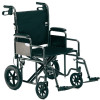Invacare TRHD22FR Owners Manual - Page 11
propel or lift the chair. Check for any signs of looseness or deterioration and if found, contact
 |
View all Invacare TRHD22FR manuals
Add to My Manuals
Save this manual to your list of manuals |
Page 11 highlights
Tipping ƽ WARNING DO NOT tip the transport chair without assistance. SECTION 2-SAFETY/HANDLING NOTE: For this procedure, refer to FIGURE 2.4. When tipping the transport chair, an assistant should grasp the back of the transport chair on a non‐removable (non‐detachable) part. Inform the transport chair occupant before tipping the transport chair and remind him/her to lean back. Be sure the occupant's feet and hands are clear of all wheels and/or pinch points. After mastering the techniques of tipping the transport chair, use the following method to tackle curbs, short stairs, etc. Place a foot on the step tube and begin to tilt the transport chair toward you. Apply a continuous downward motion until the balance point is achieved and the front casters clear the curb. At this point, the assistant will feel a difference in the weight distribution. ƽ WARNING When lowering the front casters of the transport chair, DO NOT let the transport chair drop the last few inches to the ground. This could result in injury to the occupant and/or damage to the transport chair. Roll the transport chair forward and slowly lower the front of the transport chair in one continuous movement onto the sidewalk. Push the transport chair forward until the rear wheels roll up and over the curb. Stairways Step Tube FIGURE 2.4 Tipping ƽ WARNING DO NOT attempt to lift a transport chair by lifting on any removable (detachable) parts. Lifting by means of any removable (detachable) parts of a transport chair may result in injury to the user or damage to the transport chair. Always verify that hand grips on the rear cane are secure prior to use when an assistant is used to propel or lift the chair. Check for any signs of looseness or deterioration and if found, contact a qualified technician. DO NOT attempt to move the transport chair by pulling on the hand grips if they are found to be unsecure or have deteriorated. Extreme caution is advised when it is necessary to move an occupied transport chair up or down the stairs. Invacare recommends that, if possible, the user be removed from the transport chair prior to moving. Invacare recommends using two assistants and making thorough preparations. Make sure to use only secure, non-detachable parts for hand-held supports. Follow this procedure for moving the transport chair between floors when an elevator is NOT available: 1. After the transport chair has been tilted back to the balance point, one assistant (in the rear) backs the transport chair up against the first step, while securely grasping a non‐removable (non‐detachable) part of the transport chair for leverage. 2. The second assistant, with a firm hold on a non‐detachable part of the framework, lifts the transport chair up and over the stair and steadies the transport chair as the first assistant places one foot on the next stair and repeats STEP 1. 3. The transport chair should not be lowered until the last stair has been negotiated and the transport chair has been rolled away from the stairway. Part No.1125095 11 Transport Chairs















